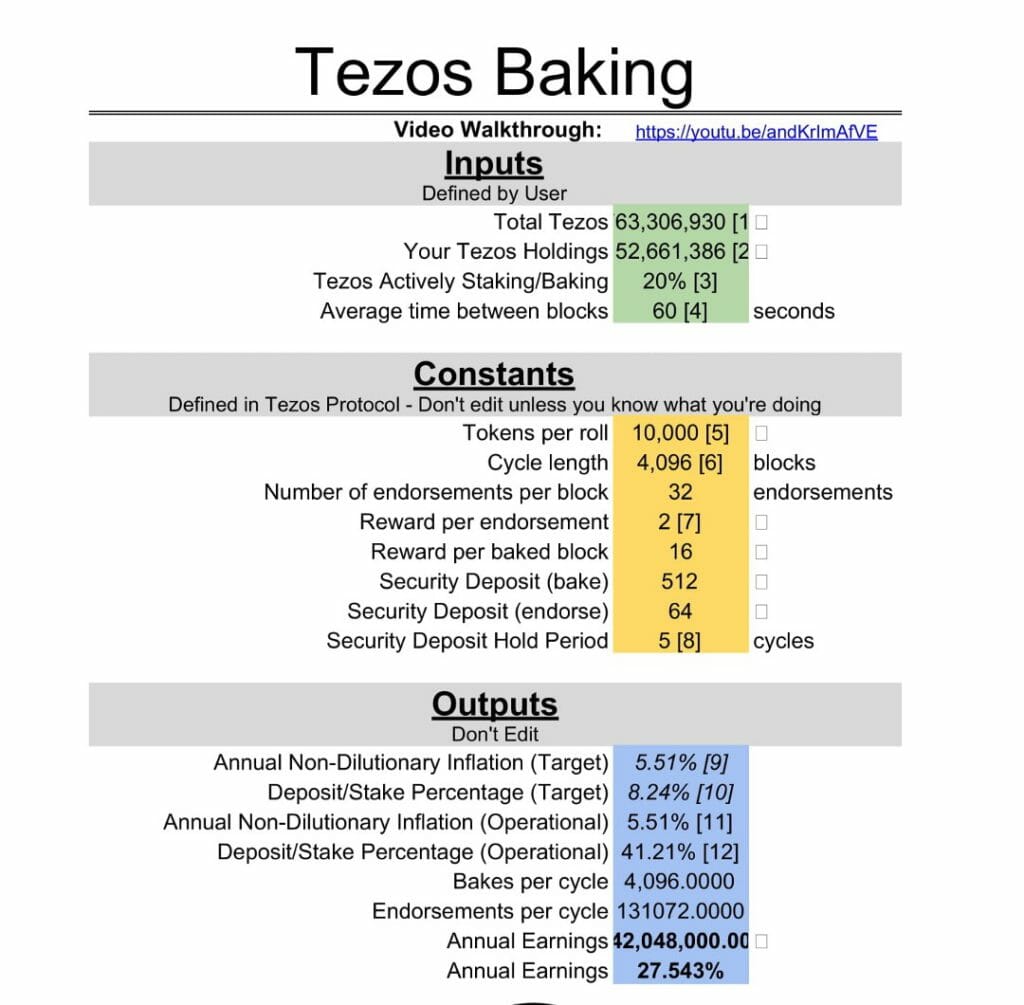
[ad_1]
What is Tezos?
Tezos (ꜩ) is a smart contract platform like Ethereum or Eos with on-chain governance and DPoS (Delegated Proof of Stake) as it’s consensus protocol. The Tezos protocol design allows it to evolve its protocol overtime without having forks, this is why Tezos calls itself a Self-amending cryptographic ledger.
Tezos emphasis on decentralization & governance as their website says
“Tezos is a new decentralized blockchain that governs itself by establishing a true digital commonwealth.”
By commonwealth means a group of people/entities with a shared goal and common interest.
Wanna stake Tezos? Checkout staking service for Tezos.
Team behind Tezos
Tezos Foundation, an organization established and regulated in Switzerland oversees the Tezos project. The Foundation has a contract with Dynamic Ledger Solutions, a company owned by KathleenB and ArthurB . Company’s task is to build Tezos’ source code.
Arthur is currently the CTO at Dynamic Ledger Solutions and leads a team of computer scientists and programmers building Tezos. He has a background in mathematics, computer science, and economics. Arthur won a bronze medal for France in the International Olympiad in Informatics at the age of 18. He earned a degree in applied math and computer science from one of France’s top universities École Polytechnique. He received a Master’s in Mathematics from New York University in 2007.
Arthur was an Associate and Goldman Sachs and later Vice President at Morgan Stanley. He left in 2016 to lead the Tezos Project. Arthur followed Bitcoin and Ethereum closely and wrote two whitepapers in 2014 outlining Bitcoin and Ethereum’s weaknesses, and he proposed a solution in the form of Tezos.
Kathleen is currently the CEO of Dynamic Ledger Solutions and leads company operations. She is originally from New Jersey. She is a graduate of Immaculate Heart Academy. She attended Cornell University and graduated in 2012. She has held a variety of positions in different firms including Bridgewater Associates, De Dicto, Accenture, and R3, an enterprise blockchain software firm.
Token Distribution
Tezos foundation raised funds for the Tezos project from 1 July 2017 to 13 July 2017. Fundraiser ran from Bitcoin block 473623 to Bitcoin block 475622 (inclusive) and collected 65,681 bitcoins and 361,122 ethers. Most of the contributions happened in the first few days. 62.5% of the contributions were in bitcoin, 37.5% in ether.
A total of 607,489,040.89 ꜩ was created in the genesis block for fundraiser participants, a further 3,156,502.85 ꜩ was created for early backers and contractors, and 76,330,692.97 ꜩ each was created for the Tezos Foundation and DLS. The allocations to the Tezos Foundation and DLS will vest monthly over 4 years. This implies a total initial supply of 763,306,929.69 ꜩ tokens with 20% locked in the vesting contracts. Total of 30,317 wallets were funded.
Tezos key Features
On-chain governance
A governance process whereby rules, voting, and choices are hardcoded (on-chain) into the blockchain protocol.
“In Tezos, protocol upgrades are formally proposed on the blockchain and voted upon by the token stakeholders according to preset governance rules. If the proposal is adopted, the proposal is compiled and automatically moves on to the Tezos testnet. After a period of testing, a confirmation vote is held and if successful the testnet is automatically promoted to the main network. This lets us upgrade without having to hard fork.”
Cryptocurrencies with on-chain governance are also still subject to “governance by hard fork”, in the same way as every other cryptocurrency. As Bitcoin was forked to start Bitcoin Cash and increase the block size limit, and Ethereum was forked to undo the DAO, a project with on-chain governance could be forked to modify or replace the formal governance processes.
Secure smart contract design for businesses
In simple words Tezos wants developers to design smart contracts carefully and able to validate them in every manner (With format verification and readable bytecode). Formal verification essentially allows developers to mathematically prove the correctness of their smart contract code.
Tezos aims to provide a straightforward platform for business logic with readable bytecode and introspectable by choosing its smart contract language michelson. Michelson target smart contracts implementing things like multisig wallets, vesting and distribution rules, etc, not every arbitrary program.
Fat protocol philosophy
Tezos supports the Fat protocol philosophy and will not support the philosophy of appcoins(tokens) like ethereum. In Tezos appcoin features can be introduced on protocol layer itself, for example, A developer could propose an amendment introducing the prediction market and attach an invoice to the amendment in order to get rewarded if the amendment is selected. It’s Tezos philosophy, In practice, you can always make appcoins(Token) on Tezos.
Inflationary Tokenomics
Tezos will use a non-dilutive inflationary policy set at a rate of around 5.5%. Non-dilutive means that if 100% of the network staked, 100% of the network would receive about 5.5% more tezzies each year, thus making the effect of the inflation neutral. If people do not choose to stake but you do, you will earn proportionally more than the inflation rate and thus be rewarded on the net. Conversely, if you are selected to validate block(s) and do not for the entire year, you will not receive any additional tezzies and your stake will proportionally shrink by about 5.5%. Delegates are likely to share some of their block rewards in a bid to attract more delegation. This can be amended by stakeholder vote in the future.
Token emission and punishments
As mentioned above Tezos will have approximately 5% inflation every year. Tezos block generation is targeted to 60 seconds. With every block Tezzies will be emitted:
Baker will get: 16 Tezzies + Transaction fees in the block
The endorser will get: 2 Tezzies
For eligible to baking and endorsing there is minimum security deposit lock up which 512 tezzies for bakers and 64 tezzies for the endorser. This deposit will be blocked till the next 20480 blocks.
So you never want to double bake, which means you need to make sure that you only ever sign one block or endorsement at any level. It’s predetermined at what block heights a baker can create a block. A baker could create uncountable variations/forks of the same block/block height. If a baker publishes different blocks for the same height he can/will be punished and will lose the security deposit.
Proof of Stake and Delegation in Tezos
Tezos proof-of-stake gives chance to create blocks and receive rewards by choosing token holders randomly based on the proportion of their holdings. It means even if you are smallholder, you can have a chance to create blocks. Only holders who won’t participate in consensus will be diluted.
As everyone holding Tezos won’t be interested in creating blocks so you can delegate this right to Delegates.
Delegation allows you to give your block producing(baking) power to another account that produces blocks(bake) for you and will generate and sign blocks on your behalf.
In Tezos terminology block producers are bakers, so here on we’ll use bakers. Bakers do not own or control your delegated tokens, They cannot spend them. However, if and when one of your tokens is randomly selected to bake a block, that right to bake will belong to the baker.
What is baking in Tezos?
In Simple words, Baking is equivalent to mining in bitcoin.
Staking / Baking a is process of actively participating in block generation and endorsing by running a node with your tokens.
Also, Tezos will have 1 baker and 32 endorsers on every block generation. Endorser witness that block is checked and validated correctly.
Tezos Baking Guide
If Bakers create an invalid block and try to fork the chain with the malicious intent they will lose their stake.
Before diving in the Baking guide we need to understand a few terms-
- Roll — To speed up computations for deciding which delegates are selected to bake, the Tezos ledger keeps track of groups of tokens called “rolls”.
- Endorsing — Endorsing is witnessing that block is checked and validated correctly. Each block has many randomly selected endorsers. Endorsers also need to put security deposits and will earn tokens by endorsing process.

So above mention is the Tezos baking spreadsheet created by Tezzigator. Now let’s understand it.
Inputs (Green)-
Total supply — Total supply of Tezos is 763,306,929.29, not including loss of coins.
Your Tezos Holdings — How many coins you want on stake? Minimum staking is 10k Tezos. This was chosen to limit the number of Rolls (defined above). If you have less than 10k Tezos you can always delegate your tokens.
Tezos actively staking/Baking– This number represents the total amount of tezos that are actively participating in block generation either by users actively staking by their own or by delegating staking rights to an active delegate.
Average time between blocks — Tazos protocol targeted for the blocktime of 60 seconds. So there should be a new block baked in every 60 seconds but in practice, this doesn’t happen. This blocktime would go longer but will not be less than 60 seconds as per protocol rules.
When the time per block remains longer from 60 seconds for weeks and months, time for block cycle of 4096 increases because of this inflation rate and your annual reward starts to drop as inflation is estimated with the assumption of being able to complete a certain number of block cycles in a year.
Constants (Yellow)-
Token per roll– 10,000 Tezos.
Cycle length — Total number of blocks per cycle which is 4096.
The number of endorsements per block — For each block, there will be 32 endorsers.
Reward per endorsement — A Potential reward for endorsing is 2 Tezos as endorsement reward depends on assigned priority but for now you can assume it’s 2 Tezos.
Security Deposit (bake) — is the number of Tezos you lock up temporarily(non spendable) when it’s your turn to bake or endorse a block. For baking, you need to deposit 512 Tezos.
Security Deposit (endorse) — For endorsing, you need to deposit 64 Tezos.
Reward per baked block — 16 Tezos (inflation) + Transaction fee in blocks.
Security Deposit Hold Period — You get your deposit and reward back after 5 Cycles (1 cycle = 4096 blocks). Here you can see the importance of cycles as if they won’t get completed in the time they will affect inflation and your yearly returns.
If you don’t stake correctly you will forfeit the deposit.
Target (Blue)-
Annual Non-Dilutionary Inflation (Target) — Tezos is an inflationary cryptocurrency, this means that the total supply of tokens will increase every year with some fixed percentage(Depends on a number of block cycles). If we have an accurate block time of 60 sec for a year for all blocks then all block cycle will be completed and in this case this inflation rate 5.5%.
Deposit/Stake Percentage (Target) — This number represents how much your stakes will be posted as deposits at any given time assuming 100% network is staking.
Annual Non-Dilutionary Inflation (Operational) — It depends on the number you input above on the spreadsheet.
Deposit/Stake Percentage (Operational) — This also depends on your input. Important thing to understand here If less then 100% network is staking you’ll be given extra opportunities to bake and endorse but you have to put more deposits.
Bakes per cycle — How many bakes per block cycle (4096 blocks makes a cycle).
Endorsements per cycle — How many endorsements per cycle.
Annual Earnings — This will represent your annual earnings.
You can view an explanatory video created by Tezzigator from which the above explanation is taken. Check this spreadsheet with checking annual earnings with detailed Tezos network data on different Tezon price.
You can also view this cool infographic created by Tezos Korea and translated into English:
For further reading checkout recourse list here. Also if you hold Tezos and want to understand any other key concepts regarding Tezos, please respond to the article.
Let’s stake some 👏 for future 😃.
References-
[ad_2]
Source link





